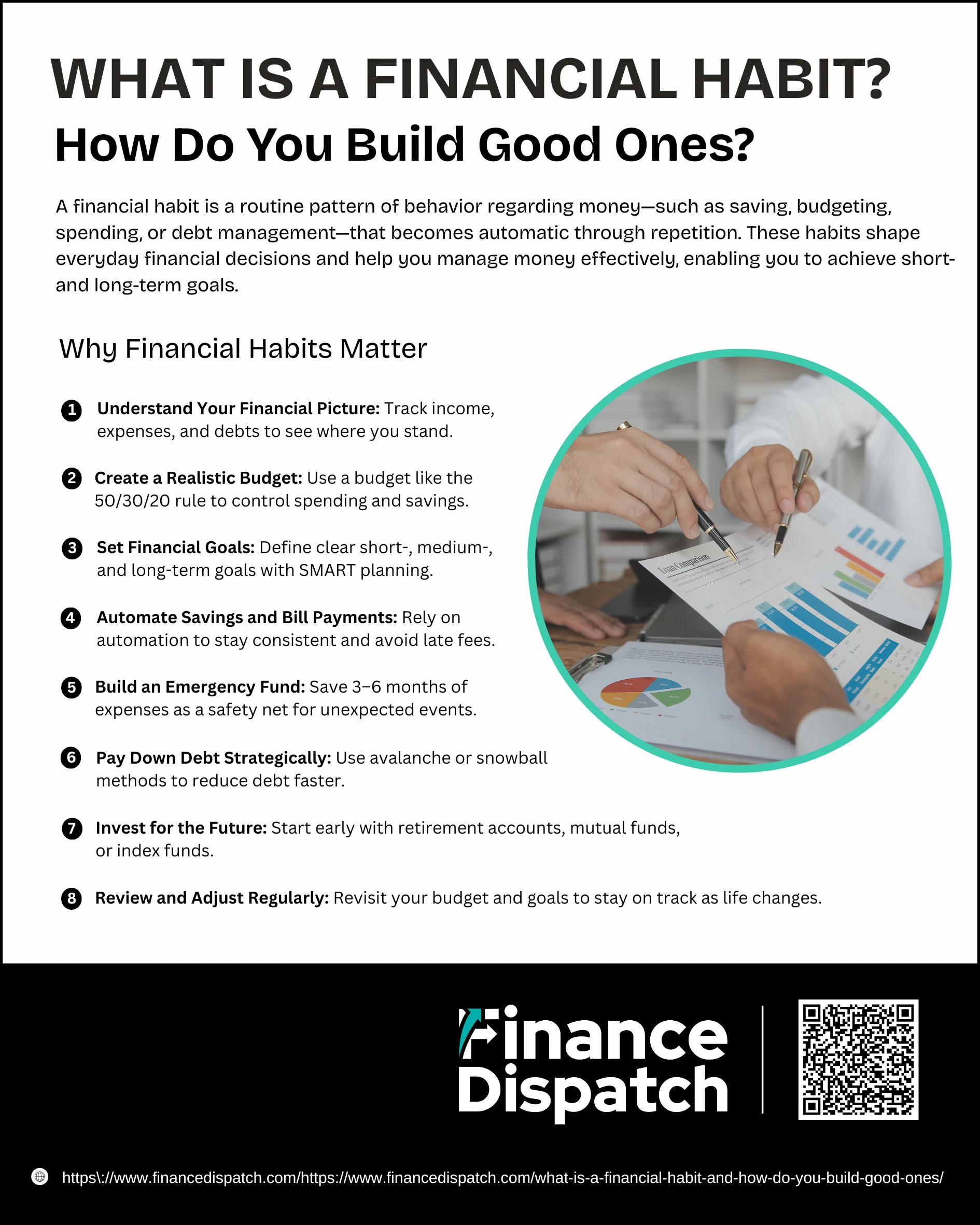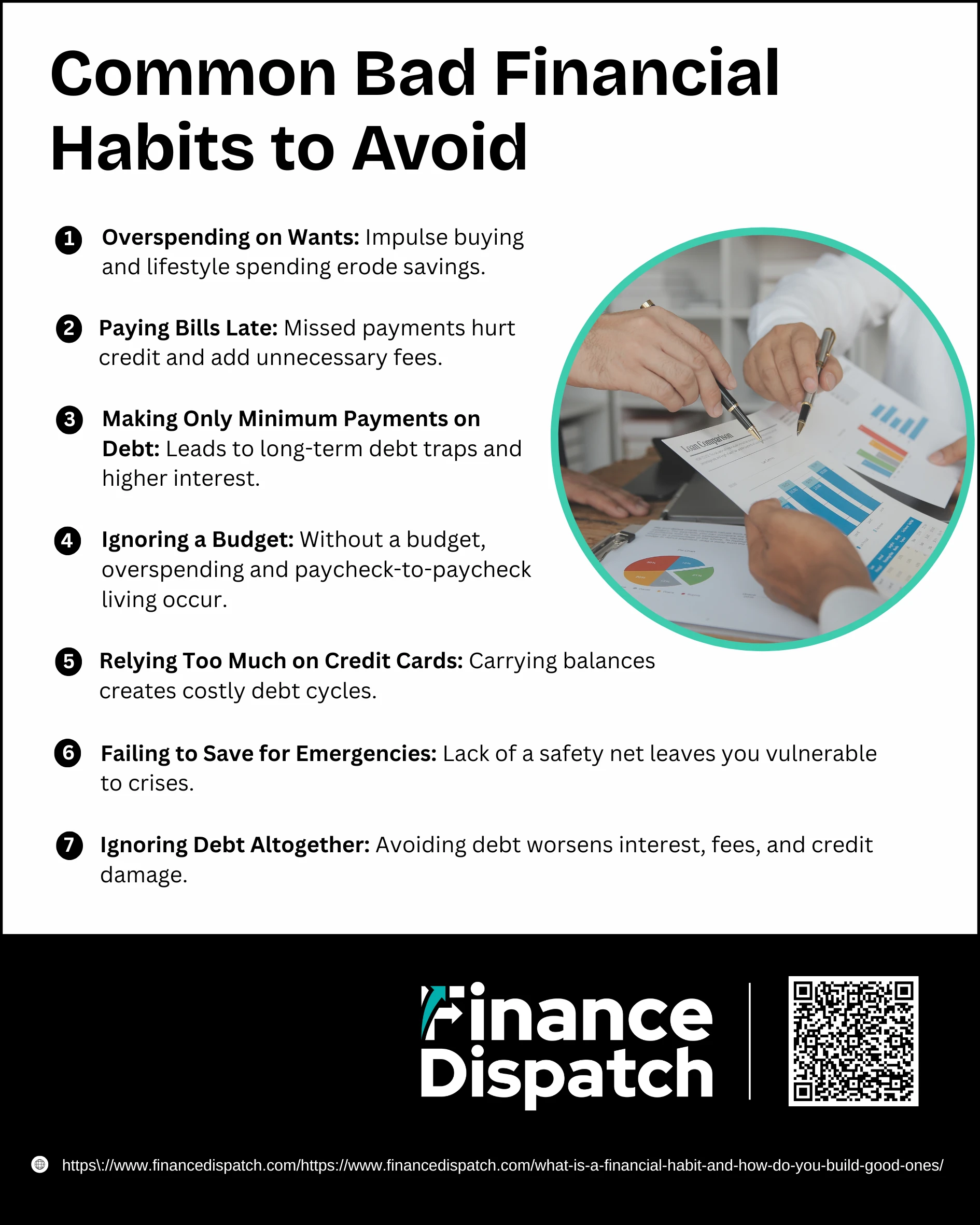When it comes to money, the small choices you make every day can add up to a lifetime of financial security—or ongoing stress. These patterns of behavior, known as financial habits, shape how you spend, save, borrow, and invest. Just like brushing your teeth or exercising regularly, financial habits are built through consistency and repetition. Good habits, such as budgeting or saving before you spend, can help you reach your goals faster, while poor habits, like overspending or ignoring debt, can hold you back. Understanding what financial habits are and learning how to build strong ones is the first step toward creating a stable and confident financial future.
What is a Financial Habit?
A financial habit is a repeated behavior or routine that influences the way you manage money over time. It could be as simple as setting aside a portion of your paycheck for savings, tracking your spending, or even swiping your credit card without thinking about the consequences. These habits often become automatic, shaping your financial health without you realizing it. Positive financial habits, like budgeting or paying bills on time, can create stability and build wealth, while negative ones, such as overspending or neglecting savings, can lead to stress and long-term money problems.
 Why Financial Habits Matter?
Why Financial Habits Matter?
Financial habits matter because they form the foundation of your overall financial well-being. The way you consistently handle money—whether it’s saving, spending, or managing debt—directly impacts your ability to reach both short-term and long-term goals. Good financial habits help you stay in control, reduce money-related stress, and prepare for unexpected expenses. Over time, these habits can build stability, improve creditworthiness, and create opportunities for financial growth. On the other hand, poor habits can quietly drain your resources and make it harder to achieve the lifestyle or security you want.
Steps to Build Good Financial Habits
Building good financial habits takes time, but each step you take today can make a big difference in your future. By practicing consistency and discipline, you can reduce money stress, reach important milestones, and create long-term financial stability. Here are some practical steps to get started:
1. Understand Your Financial Picture
The first step is knowing exactly where you stand financially. List your sources of income, track all your expenses, and calculate your debts. This helps you see whether you’re living within your means or overspending. Having a clear snapshot of your finances also makes it easier to identify problem areas that need attention.
2. Create a Realistic Budget
A budget acts as your financial roadmap. Popular methods like the 50/30/20 rule—50% for needs, 30% for wants, and 20% for savings—can help balance essentials and lifestyle choices. You can use spreadsheets or budgeting apps to track and adjust your spending. A realistic budget gives you control and ensures your money is being used in line with your goals.
3. Set Financial Goals
Having clear goals provides motivation and direction. Break them down into short-term (building an emergency fund), medium-term (saving for a car or vacation), and long-term (retirement planning). SMART goals—specific, measurable, achievable, relevant, and time-bound—work best. Each goal should be tied to a plan, so you know how much to save and when.
4. Automate Savings and Bill Payments
Automation makes financial discipline easier. Set up direct deposits that automatically transfer a portion of your paycheck into a savings account. Likewise, schedule automatic bill payments to avoid late fees and credit score damage. With less reliance on willpower, you’ll stay consistent without needing to think about it every month.
5. Build an Emergency Fund
Life is unpredictable—job loss, medical emergencies, or car repairs can throw you off track. An emergency fund provides a safety net so you don’t have to rely on credit cards or loans in tough times. Aim to save at least three to six months’ worth of living expenses. Even starting small and gradually building up makes a big difference over time.
6. Pay Down Debt Strategically
Debt, especially high-interest credit card debt, can drain your finances quickly. Focus on paying off the most expensive debt first (the avalanche method) or clearing smaller balances for motivation (the snowball method). Consistently paying more than the minimum helps reduce overall interest costs and frees up money for future goals.
7. Invest for the Future
Investing allows your money to grow over time through compounding returns. Start early, even if the amount is small. Options include retirement accounts like a 401(k) or IRA, mutual funds, or index funds. While investing carries risks, the long-term rewards can significantly boost your wealth and help you reach goals like retirement or homeownership.
8. Review and Adjust Regularly
Your financial situation will change—new job, family responsibilities, or unexpected expenses. That’s why it’s important to review your finances every few months. Revisit your budget, check your savings progress, and adjust your goals if needed. This habit keeps your financial plan relevant and ensures you stay on track.
 Common Bad Financial Habits to Avoid
Common Bad Financial Habits to Avoid
Bad financial habits can quietly drain your resources and limit your ability to achieve financial stability. The tricky part is that these habits often become so routine you hardly notice them until they cause bigger problems. Recognizing them is the first step to breaking the cycle and replacing them with better practices. Here are some of the most damaging money habits to avoid:
1. Overspending on Wants
Many people fall into the trap of spending on things they don’t truly need—like frequent takeout, the latest gadgets, or impulse online shopping. While these purchases may bring short-term satisfaction, they can quickly erode your savings. Over time, overspending keeps you from building wealth and may force you to rely on credit.
2. Paying Bills Late
Missing payment deadlines often leads to late fees, higher interest charges, and a negative impact on your credit score. A poor credit history can make it harder to qualify for loans, mortgages, or even rental agreements in the future. This bad habit also adds unnecessary stress, as you’re constantly playing catch-up instead of staying ahead.
3. Making Only Minimum Payments on Debt
Paying just the minimum due on credit cards or loans may keep you in good standing, but it also traps you in long-term debt. Interest charges accumulate, meaning you’ll pay far more than the original balance. This habit makes it nearly impossible to get out of debt and prevents you from using your income for future goals like saving or investing.
4. Ignoring a Budget
Without a budget, you don’t have a clear picture of where your money goes each month. This lack of structure often leads to overspending and living paycheck to paycheck. Ignoring a budget also means missing opportunities to save, pay down debt, or build an emergency fund. In short, it leaves your finances on autopilot—with little control.
5. Relying Too Much on Credit Cards
Credit cards can be useful tools, but depending on them for everyday purchases is risky if you don’t pay them off in full. Carrying balances month after month leads to compounding interest charges, sometimes at very high rates. This creates a cycle where debt grows faster than you can pay it down, keeping you financially stuck.
6. Failing to Save for Emergencies
Unexpected events—like car breakdowns, medical bills, or job loss—are inevitable. Without an emergency fund, you may be forced to borrow or rely on credit cards, putting you deeper in debt. Not saving for emergencies leaves you financially vulnerable and adds stress during already difficult times.
7. Ignoring Debt Altogether
Some people try to cope with financial stress by avoiding their debt, but ignoring it doesn’t make it disappear. Interest continues to build, late fees pile up, and creditors may take collection action. This habit can seriously damage your credit score, making it harder to get loans or even affect future job opportunities if employers check credit history.
Characteristics of Good Financial Habits
Good financial habits are not just about saving money—they’re about creating routines that bring stability, reduce stress, and support your long-term goals. These habits are built on consistency, discipline, and smart decision-making that align with your values and future plans.
Key Characteristics:
1. Consistency – Practicing healthy financial behaviors regularly, such as tracking expenses or saving every month, until they become second nature.
2. Discipline – Resisting the urge for impulse spending and making choices that prioritize long-term benefits over short-term pleasures.
3. Goal-Oriented – Linking daily money habits to specific goals, such as building an emergency fund, buying a home, or planning for retirement.
4. Adaptability – Adjusting your financial strategies when circumstances change, like shifting your budget after a new job or family expense.
5. Proactiveness – Anticipating future needs, such as insurance coverage or retirement savings, instead of reacting to problems when they arise.
6. Automation – Using tools to automate bill payments, savings, or investments so that good habits run smoothly in the background.
7. Awareness – Staying mindful of your income, spending, debts, and investments to make informed financial decisions.
Examples of Good Financial Habits You Can Start Today
The best way to take control of your money is to start with simple, actionable habits that fit into your everyday life. These small steps may seem minor at first, but when practiced consistently, they can make a huge difference in your financial security and confidence over time.
Good Financial Habits to Practice:
1. Track your spending – Keep a record of where your money goes each month using a budgeting app or a simple spreadsheet.
2. Pay yourself first – Automatically transfer a portion of your income into savings before spending on anything else.
3. Build an emergency fund – Start with a small amount and work toward saving three to six months’ worth of expenses.
4. Pay bills on time – Set reminders or automate payments to avoid late fees and protect your credit score.
5. Overpay debts when possible – Even small extra payments can reduce interest and help you become debt-free faster.
6. Review insurance annually – Make sure your coverage matches your current needs, such as health, home, or auto insurance.
7. Save for retirement early – Contribute to retirement accounts regularly to take advantage of compound growth.
8. Practice mindful spending – Use techniques like the 72-hour rule before making non-essential purchases to cut down on impulse buys.
Comparing Bad vs. Good Habits
Bad financial habits can quietly drain your resources, while good habits help you build security and reach long-term goals. Understanding the difference between the two makes it easier to identify where you need to make changes and what positive actions you can adopt instead.
| Bad Financial Habit | Good Financial Habit |
| Impulse spending | Waiting 72 hours before making purchases (mindful spending) |
| Paying bills late | Automating bill payments or setting reminders |
| Making only minimum payments on debt | Paying more than the minimum and prioritizing high-interest debt |
| Ignoring a budget | Creating and following a realistic budget (e.g., 50/30/20 rule) |
| Relying heavily on credit cards | Using cash or debit for daily expenses and paying credit cards in full |
| Not saving for emergencies | Building an emergency fund with at least 3–6 months of expenses |
| Avoiding retirement planning | Starting early with regular retirement contributions |
| Neglecting financial reviews | Reviewing budget, goals, and insurance annually |
Conclusion
Financial habits shape the way you experience money—either as a source of stress or as a tool for security and growth. By recognizing harmful patterns and replacing them with positive, consistent behaviors, you can build a strong foundation for your financial future. Good habits like budgeting, saving, and mindful spending don’t require drastic changes; they grow through small, daily actions that compound over time. The sooner you start building them, the sooner you’ll feel more confident and in control of your financial journey.



